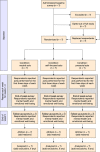Using prosocial behavior to safeguard mental health and foster emotional well-being during the COVID-19 pandemic: A registered report protocol for a randomized trial
- PMID: 33503045
- PMCID: PMC7840018
- DOI: 10.1371/journal.pone.0245865
Using prosocial behavior to safeguard mental health and foster emotional well-being during the COVID-19 pandemic: A registered report protocol for a randomized trial
Update in
-
Using prosocial behavior to safeguard mental health and foster emotional well-being during the COVID-19 pandemic: A registered report of a randomized trial.PLoS One. 2022 Jul 28;17(7):e0272152. doi: 10.1371/journal.pone.0272152. eCollection 2022. PLoS One. 2022. PMID: 35901118 Free PMC article. Clinical Trial.
Abstract
The COVID-19 pandemic, the accompanying lockdown measures, and their possible long-term effects have made mental health a pressing public health concern. Acts that focus on benefiting others-known as prosocial behaviors-offer one promising intervention that is both flexible and low cost. However, neither the range of emotional states prosocial acts impact nor the size of those effects is currently clear, both of which directly influence its attractiveness as a treatment option. Using a large online sample from Canada and the United States, we will examine the effect of a three-week prosocial intervention on two indicators of emotional well-being (happiness and the belief that one's life is valuable) and mental health (anxiety and depression). Respondents will be randomly assigned to perform prosocial, self-focused, or neutral behaviors each week. Two weeks after the intervention, a final survey will assess whether the intervention has a lasting effect on mental health and emotional well-being. Our results will illuminate whether prosocial interventions are a viable approach to addressing mental health needs during the current COVID-19 pandemic, as well for those who face emotional challenges during normal times.
Conflict of interest statement
The authors have declared that no competing interests exist.
Figures
References
-
- Nations United. COVID-19 and the Need for Action on Mental Health. 2020. Available: https://www.un.org/sites/un2.un.org/files/un_policy_brief-covid_and_ment...
Publication types
MeSH terms
LinkOut - more resources
Full Text Sources
Other Literature Sources
Medical



